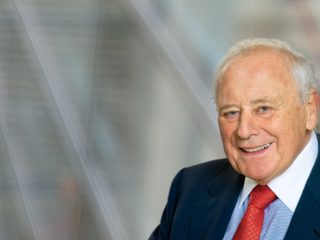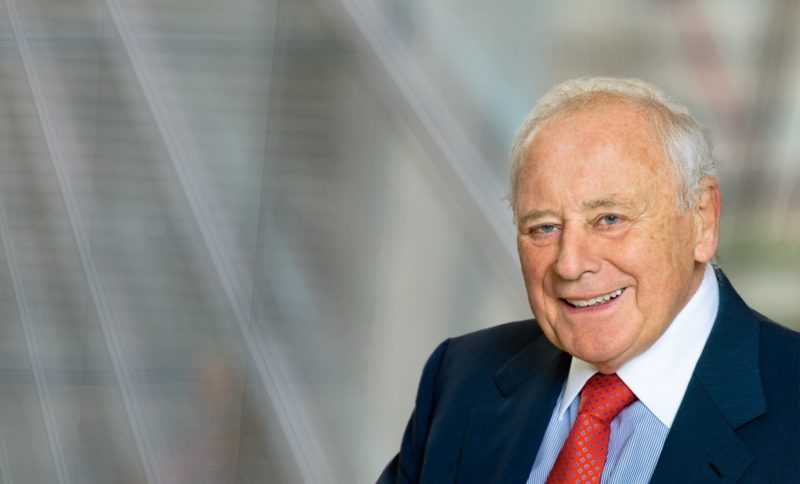
“The generation of the Second World War is no longer there”, writes Reinhold Würth, Chairman of the Supervisory Board of the Würth Group, in our article series “Europe can do better. How our continent finds new strength. A wake-up call from economy“, initiated by Handelsblatt and United Europe. “Today’s citizens of the EU must beware of nationalist tendencies.”
This collection of essays titled “Wake-up Call for Europe” seems almost arbitrary: The Congress of Vienna of 1814/1815 could have been held under the same motto. There, the final goal of the event was achieved with a variety of political haggling, intrigues and individual contracts, which was to create endless peace in Europe. Nevertheless, the coalition and vote-splitting between the great powers at the time did not ultimately prevent two world wars being fought largely on European territory, with over 60 million war deaths.
With the end of the Cold War in 1989, hope was quickly born that there would never be a war in Europe again. The founding of the European Economic Community in 1952 and its further development into the European Union in 1992 as a union of states with (still) 28 members seemed to absolutely safeguard peace for future generations in Europe.
Today, in 2019, in many European countries and beyond, we are seeing a resurgence of nationalist tendencies and economic protectionism is being tried out—just think of the trade dispute between China and the US. Driven by two similar developments, even the members of the European Union, brought together and held together by the threat from the East during the Cold War, perceive the exact opposite of a wake-up call for Europe: Most of the generation having witnessed the Second World War has now died, today’s citizens of the European Union are better off than ever before, and the notion of what war and want actually mean has largely been lost.
This has led to the resurging proliferation of old nationalistic tendencies all claiming that “We want our country back”, the free movement of people takes away our identity, perhaps even our religion, and eventually our language. Let us go back and leave the EU, or at least reduce the European Union to a rather non-binding economic club primarily concerned with free trade. This is also the absurd demand of EU opponents in Germany. Don’t the followers of these streams understand that, in terms of geo-strategy, we Europeans are nestled between the power blocs of the US, China and Russia and that if we don’t stick together closely we will only be tribute-paying vassals of these three power blocs in 20 years from now?
The biggest problem of the further development of the European Union can be explained in a nutshell. The European Union’s main problem is the surge in particularism of late: Nationalists, separatists, especially from the right, such as Marine Le Pen, Geert Wilders, Italy’s Northern League and Five Star Movement (Movimento 5 Stelle), as well as the AfD in Germany are trying to undermine the basic ideals of the European Union, at least to degrade it to a rather random free trade association or best to destroy it altogether. Despite all of this, the European Union has been highly successful: Unemployment is falling, as is youth unemployment, the gross national product is rising, the Community Law is making good progress—so what are the origins of this mismatch?
Here we have the main problem: The European Union with all its institutions, from Parliament to the President of the Commission, has created European facts at a good speed, without sufficiently including, informing and inspiring the population of the 27 Member States.
The insecurity of the population is caused by a lack of information on European integration and the polite restraint of the pro-European movements towards the strikingly simplifying, catchy anti-European slogans of the separatists.
This is the main key to the wake-up call for Europe: The European Union should also spend a lot of money on solid, professional advertising campaigns to educate citizens about its very positive aspects. The curricula of all schools in the European Union should contain a lot more history and civics classes dedicated to the origins, the fundamental development and, above all, the future of the European Community.
In addition, the idea of “Europe” should always have a positive notion by our Members of the European Parliament being present in schools, at information events, in citizens’ consultation hours, in advertisements, etc. It is of paramount importance to invite the citizens to the journey towards a united Europe.
A third component of a wake-up call for Europe would be to make more people known throughout Europe as leading figures. French President Emmanuel Macron is a shining example; despite his domestic political difficulties, he is a fervent champion of the European Union and, above all, a role model for young people.
As Jean-Claude Juncker’s successor, Emmanuel Macron could be a true face for the European Union, unlike the bland candidate Manfred Weber (CSU), who would only strengthen the conceited bureaucratic mentality of the European administration.
The article series “Europe can do better” appears in Handelsblatt in German and in German and English on Handelsblatt Online and the website of United Europe until the European Elections. They are also collected in a book which was published on 15 April, 2019 by Herder-Verlag. Please find more information about the book in German here.
About Reinhold Würth
Reinhold Würth was born in Öhringen on April 20, 1935. His father Adolf Würth founded a wholesale company for screws and nuts in 1945, today Adolf Würth GmbH & Co. KG. At the age of only 14, Reinhold Würth joined his father’s company as the first employee and apprentice and successfully completed his training as a wholesale and retail salesman in 1952 with an examination at the Chamber of Industry and Commerce.
After the early death of his father in 1954, Reinhold Würth accepted the challenge at the age of 19 to continue the family business. The first business year under his management ended in 1955 with an annual turnover of EUR 80,000. The reconstruction of Germany after the Second World War favored the rapid growth of the company: fasteners such as screws and nuts were needed everywhere. Reinhold Würth realized early that the key to success lies in growth. Already in 1962, he took the plunge abroad and founded the first foreign company in the Netherlands. In 1987, Würth was already active on all five continents.
Today, with over 400 companies in more than 80 countries around the world, the Würth Group is active in the market. The Würth Group employs more than 71,000 people and achieved a new record turnover of EUR 11.8 billion in 2016. In 2006, Reinhold Würth handed over the chairmanship of the Advisory Board of the Würth Group to his daughter Bettina Würth. He himself is Chairman of the Supervisory Board of the Würth Group and Honorary Chairman of the Advisory Board of the Würth Group.



